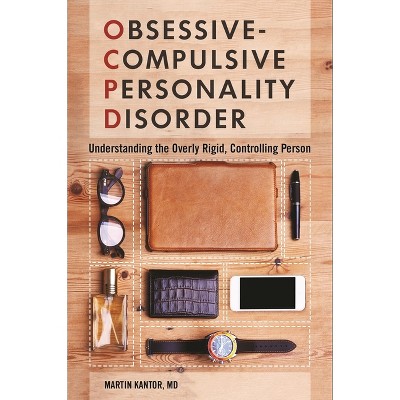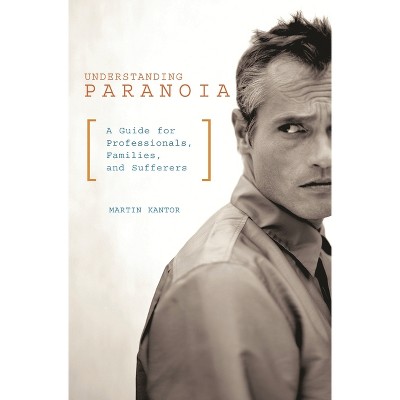The Psychopathy of Everyday Life - by Martin Kantor (Hardcover)

About this item
Highlights
- Is there a mild psychopath near you?
- About the Author: Martin Kantor, MD is a Harvard psychiatrist who has been in full private practice in Boston and New York City, and active in residency training programs at several hospitals, including Massachusetts General and Beth Israel in New York.
- 224 Pages
- Psychology, Psychopathology
Description
About the Book
Is there a mild psychopath near you? Or in you? If so, what can and should you do? Find out in this riveting exploration of a personality disorder usually dismissed by the mental health profession, and never before the topic of in-depth scholarly exploration. We all recognize the true, full-blown psychopaths--the Hitlers, Stalins and Gacys of the world. But what professionals and lay people, alike often do not recognize is that we are surrounded by mild psychopaths, people who do not reach the level of their infamous counterparts, yet still share some of their traits. Fifteen-time author Kantor, a psychiatrist whose last work, Understanding Paranoia, also zeroed in on everyday problems, explains how to recognize, understand and cope with the mild psychopaths one encounters every day.
Who are these everyday psychopaths? They are politicians who lie to get votes, swindlers who phish the Internet to steal identities, salesmen who push cars or other products they know are lemons, businessmen who dupe the public in ways that barely skirt the law, doctors who perform unnecessary surgery because they need the money. The list goes on. Some would argue that each of us must use some of the means of the mild psychopath to be successful in life. Where is the line, and what do you do when those around you cross it? The Psychopathy of Everyday Life helps you decide.
Kantor spotlights and disproves widely-held beliefs about mild psychopathy, then shows us methods to deal with such people, and such traits in ourselves. His conclusions and vignettes drawn from the treatment room and from everyday life, for example, show that psychopathy is a widespread problem, not one confined to low life' people in jails, or to men and women in mental hospitals. Psychopaths are not all failures in life who could be labled either bad' or mad;' many are quite successful and held up as models. And they are not all guilt-free with no conscience; some do want to escape their aggressive and socially harmful world where being honest, forthright and ethical is abnormal. Kantor offers an eclectic approach based on classic therapies to facilitate help and self-help methods for the victim and the psychopath.
Book Synopsis
Is there a mild psychopath near you? Or in you? If so, what can and should you do? Find out in this riveting exploration of a personality disorder usually dismissed by the mental health profession, and never before the topic of in-depth scholarly exploration. We all recognize the true, full-blown psychopaths--the Hitlers, Stalins and Gacys of the world. But what professionals and lay people, alike often do not recognize is that we are surrounded by mild psychopaths, people who do not reach the level of their infamous counterparts, yet still share some of their traits. Fifteen-time author Kantor, a psychiatrist whose last work, Understanding Paranoia, also zeroed in on everyday problems, explains how to recognize, understand and cope with the mild psychopaths one encounters every day.
Who are these everyday psychopaths? They are politicians who lie to get votes, swindlers who phish the Internet to steal identities, salesmen who push cars or other products they know are lemons, businessmen who dupe the public in ways that barely skirt the law, doctors who perform unnecessary surgery because they need the money. The list goes on. Some would argue that each of us must use some of the means of the mild psychopath to be successful in life. Where is the line, and what do you do when those around you cross it? The Psychopathy of Everyday Life helps you decide. Kantor spotlights and disproves widely-held beliefs about mild psychopathy, then shows us methods to deal with such people, and such traits in ourselves. His conclusions and vignettes drawn from the treatment room and from everyday life, for example, show that psychopathy is a widespread problem, not one confined to low life' people in jails, or to men and women in mental hospitals. Psychopaths are not all failures in life who could be labled either bad' or mad;' many are quite successful and held up as models. And they are not all guilt-free with no conscience; some do want to escape their aggressive and socially harmful world where being honest, forthright and ethical is abnormal. Kantor offers an eclectic approach based on classic therapies to facilitate help and self-help methods for the victim and the psychopath.Review Quotes
"Antisocial personality disorder (APD)--the condition one sees in the sociopath next door, the label applied by Martha Stout in her book by the same title (2005), or in mild psychopaths, as Kantor (psychiatrist, trainer of psychiatrists at various hospitals) labels them--is currently a hot topic in clinical psychology. Individuals with APD can wreak havoc on communities. These individuals are not psychopathic serial killers. Rather, these are neighbors who blast their horns at drivers who do not get moving . . . turn up their personal stereos . . . yell into their cell phones . . . rev up their motorcycles at night . . . or put their dogs to sleep because they bark too much. Kantor does a thorough job of describing mild psychopaths and their behavior while differentiating them from those with APD and other disorders. He provides a thorough examination of the etiology, personality structure, and course/prognosis of this disorder and finishes with excellent chapters on therapy with mild psychopaths and a six-step method for helping victims cope with the psychopathy of everyday life. . . . Essential. Upper-division undergraduates through faculty and professionals; general readers." --Choice
"Practitioner and author Kantor explains how to recognize, understand and cope with mild psychopaths, including politicians who lie, sales people who push bad products, Internet cruisers who are in reality identity thieves. He also helps define the difference between being a psychopath and being successful in Western society. He describes behaviors, the core personality structures, associated and overlapping disorders, social issues and successful psychopaths, causes, course of the disease and diagnosis, therapy and coping mechanisms." --SciTech Book News "[K]antor has taken on an important and difficult subject." --PsycCritiquesAbout the Author
Martin Kantor, MD is a Harvard psychiatrist who has been in full private practice in Boston and New York City, and active in residency training programs at several hospitals, including Massachusetts General and Beth Israel in New York. He also served as Assistant Clinical Professor of Psychiatry at Mount Sinai Medical School and as Clinical Assistant Professor of Psychiatry at the University of Medicine and Dentistry of New Jersey--New Jersey Medical School. He is currently a full-time medical author, the author of more than a dozen other books, including Homophobia, Second Edition (Praeger 2009); Uncle Sam's Shame: Inside the Veteran's Administration (Praeger 2008); Lifting the Weight: Understanding Depression in Men: Its Causes and Solutions (Praeger 2007); The Psychopathy of Everyday Life: How Antisocial Personality Disorder Affects All of Us (Praeger, 2006); Understanding Paranoia: A Guide for Professional, Families, and Sufferers (Praeger 2004); Distancing: Avoidant Personality Disorder, Revised and Expanded (Praeger, 2003), Passive-Aggression: A Guide for the Therapist, the Patient, and the Victim (Praeger, 2002), Treating Emotional Disorder in Gay Men (Praeger, 1999), and Homophobia (Praeger, 1998).




